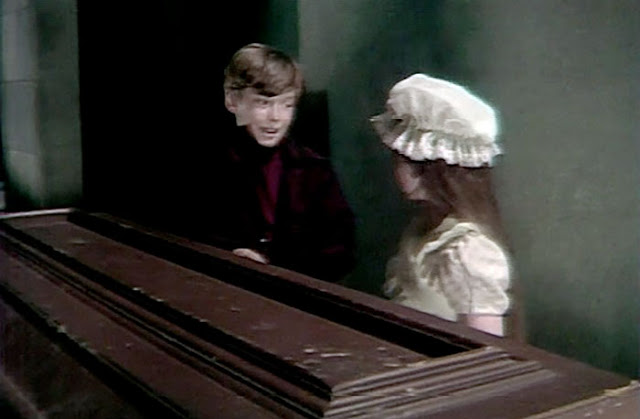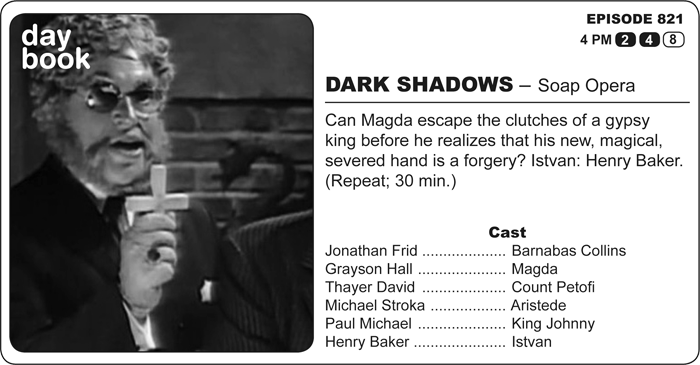
By PATRICK McCRAY
Taped on this day in 1967: Episode 305
When Sarah takes David on a tour of her home, will there be room for one more in the mausoleum? Sarah: Sharon Smyth. (Repeat; 30 min.)
Barnabas kvetches about the weakening side-effect of Julia’s injections, although she seems delighted. Meanwhile, Sarah shows David a hidden coffin.
Curses are blessings on Dark Shadows, and that’s not always limited within the series itself; it’s also true for how the show was made. Truth time: the soap format slides easily into something that, without love and context, is unwatchably slow and dull. But it is not without its advantages, also. Usually, the command to stretch it out is a mandate for repetition. But in certain cases, the writers found fascinating eddies of implication to explore, and 305 is an example of why people kept watching -- it asks the questions we all all have. In this case, about the afterlife and the practicalities of the paranormal.
The episode is vaguely split between Barnabas & Julia and David & Sarah. Both involve a human dealing with the vagaries of supernatural lifeforms, unwittingly or not. Barnabas is developing impatience with Julia’s conversion process. He’s tired of the perpetual hangover intrinsic to being human, and I think he’s beginning to suspect that Julia either has no idea what she’s doing or is purposefully dragging it out. Barnabas has had remarkably good health for nearly two centuries, so we can understand his disappointment. He’s reacting as if she’s spiking his sherry with saltpeter, and for all we know, she might. Julia’s savoring his lack of vitality, crossing weird lines between doctor, mother, and lover, promising that “she’ll take care of Burke Devlin” her own way, and conjuring images of Rosa Klebb’s clumsy attempt at lesbian seduction in From Russia with Love. It takes a very special lesbian to win Burke Devlin.
Meanwhile, outside, David and Sarah discuss her knack for letting David in on secrets, and she tantilizes him with the promise of a whopper. This leads to a marvelously acted dialogue where Smythe mixes a very simple honesty with a beautifully textured ambiguity, struggling to explain the where she lives in the afterlife. Sarah never claimed to be alive; she just uses the metaphors of living. Here, it’s clear that Sarah knows what she is, and as straight as she can be, how she lives. She’s not being coy. David is simply not hearing her. I have no idea if the young actress considered the strange weight of the netherworld of her implication, but I would love to know. Quite simply, Sharon Smyth kicks ass. For a child actress understandably entranced by the teleprompter, Smythe shows remarkable sophistication in this episode, and the result may be one of Sarah’s best, most empowered performances in the series. Dark Shadows, in this era, excels at hinting. Everything is offstage. Huge casts of characters we’ve yet to meet. To hear it about the afterlife only heightens our curiosity.
Dark Shadows excels not just at horror, but showing us the inner workings and practicalities of the horrific from new perspectives. The David/Sarah relationship is one of the most poignant on the program. Each is as lonely and lost as the adults on the show. (In that regard, Carolyn, Joe, and Maggie are the sore thumbs on the hand because they seem the least lonely, until they aren’t.) Sarah’s overall game may be to curb Barnabas’ opportunities for evil. Or, drawn from death’s domain by her brother’s resurrection, it may simply be to have a friend the way that Barnabas wants a lover. Vicki will recognize physical resemblances when she goes to the past. Does Sarah see the same thing? By making Sarah the most realistic ghost in horror, the show raises all of the right questions, and ones we never knew we had.

